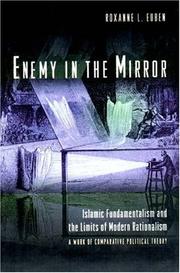| Listing 1 - 1 of 1 |
Sort by
|

ISBN: 0691058431 069105844X 1282753819 9786612753817 1400823234 140081152X 9781400823239 9780691058443 9780691058436 Year: 1999 Publisher: Princeton (N.J.): Princeton university press
Abstract | Keywords | Export | Availability | Bookmark
 Loading...
Loading...Choose an application
- Reference Manager
- EndNote
- RefWorks (Direct export to RefWorks)
A firm grasp of Islamic fundamentalism has often eluded Western political observers, many of whom view it in relation to social and economic upheaval or explain it away as an irrational reaction to modernity. Here Roxanne Euben makes new sense of this belief system by revealing it as a critique of and rebuttal to rationalist discourse and post-Enlightenment political theories. Euben draws on political, postmodernist, and critical theory, as well as Middle Eastern studies, Islamic thought, comparative politics, and anthropology, to situate Islamic fundamentalist thought within a transcultural theoretical context. In so doing, she illuminates an unexplored dimension of the Islamist movement and holds a mirror up to anxieties within contemporary Western political thought about the nature and limits of modern rationalism--anxieties common to Christian fundamentalists, postmodernists, conservatives, and communitarians. A comparison between Islamic fundamentalism and various Western critiques of rationalism yields formerly uncharted connections between Western and Islamic political thought, allowing the author to reclaim an understanding of political theory as inherently comparative. Her arguments bear on broad questions about the methods Westerners employ to understand movements and ideas that presuppose nonrational, transcendent truths. Euben finds that first, political theory can play a crucial role in understanding concrete political phenomena often considered beyond its jurisdiction; second, the study of such phenomena tests the scope of Western rationalist categories; and finally, that Western political theory can be enriched by exploring non-Western perspectives on fundamental debates about coexistence.
Islamic fundamentalism --- Rationalism --- Islamic countries --- Politics and government --- Islamic fundamentalism. --- Rationalism. --- #SBIB:031.IO --- #SBIB:321H91 --- #SBIB:316.331H330 --- Knowledge, Theory of --- Religion --- Belief and doubt --- Deism --- Free thought --- Realism --- Fundamentalism, Islamic --- Islamism --- Islam --- Religious fundamentalism --- Niet-specifieke politieke en sociale theorieën vanaf de 19e eeuw: islam, Arabisch nationalisme --- Godsdienst en politiek: algemeen --- -Muslim countries --- Politics and government. --- Islamic countries - Politics and government --- Alterity. --- Ambiguity. --- Anachronism. --- Anathema. --- Anthropomorphism. --- Anti-Oedipus. --- Anti-Western sentiment. --- Anti-imperialism. --- Antinomy. --- Apologetics. --- Assassination. --- Authoritarianism. --- Clash of Civilizations. --- Communitarianism. --- Criticism. --- Critique of ideology. --- Critique. --- Deductive reasoning. --- Deism. --- Demagogue. --- Despotism. --- Dialectical materialism. --- Dichotomy. --- Dictatorship. --- Disadvantage. --- Disenchantment. --- Emotivism. --- End of history. --- Ethnocentrism. --- Excommunication. --- False consciousness. --- False god. --- God. --- Great Satan. --- Hannah Arendt. --- Heresy. --- Heterodoxy. --- Hostility. --- Hypocrisy. --- Ideology. --- Idolatry. --- Impediment (canon law). --- Imperialism. --- Infidel. --- Injunction. --- Inner-worldly asceticism. --- Irrationality. --- Irreligion. --- Islam. --- Islamic extremism. --- Islamism. --- Islamization of knowledge. --- Jamal ad-Din al-Afghani. --- Jihadism. --- Legitimation crisis. --- Manichaeism. --- Materialism. --- Militarism. --- Modernity. --- Nihilism. --- Obscurantism. --- Oppression. --- Orientalism. --- Overreaction. --- Paradox. --- Political Order in Changing Societies. --- Political alienation. --- Political aspects of Islam. --- Political decay. --- Political philosophy. --- Political prisoner. --- Politics. --- Postmodern philosophy. --- Postmodernism. --- Prejudice. --- Protest vote. --- Qutb. --- Radicalism (historical). --- Radicalization. --- Rashid Rida. --- Reactionary. --- Rebuttal. --- Reformism. --- Religion. --- Seditious conspiracy. --- Separate spheres. --- Separation of church and state. --- Sharia. --- Skepticism. --- Social criticism. --- Sovereignty. --- Spiritual crisis. --- Superstition. --- The End of Ideology. --- Truism. --- Vagueness. --- Vulnerability. --- Wahhabism. --- Yellow Peril.
| Listing 1 - 1 of 1 |
Sort by
|

 Search
Search Feedback
Feedback About UniCat
About UniCat  Help
Help News
News